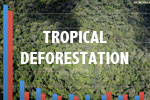Two prominent groups of researchers have reached a consensus estimate for emissions from tropical deforestation between 2000 and 2005.
The groups, led by Winrock International and Woods Hole Research Center, conclude that carbon dioxide emissions from tropical deforestation during the period averaged three billion (800 million tons of carbon) tons per year, with an error range of 1.1 billion tons. The consensus is important because two groups earlier this year published academic papers that initially seemed to offer starkly different estimates on emissions. However once timeframes, differences in methodologies, and disparities in data sets were considered, the results were “remarkably consistent,” according to a joint statement issued by the groups.

|
“Both initial studies offer insights into different ways to measure tropical deforestation. But the fact that we were able to reconcile these different studies across very different sets of data and methodologies, should provide remarkable reassurance to policymakers that they can act with science on their side,” said the Woods Hole Research Center’s Alessandro Baccini, lead author of the Nature Climate Change study published in January.
“With this new scientific consensus and reconciliation between our two independent studies, policymakers now have an unbiased, historic benchmark against which emission reduction targets for tropical deforestation can be set and progress can be measured,” added Nancy Harris, lead author of the Science paper, which was published in June.
One of the major differences in the estimates stemmed from emissions from forest degradation and peatlands. Baccini’s study factored these emissions into their results, where as the group led by Harris did not. The researchers have not yet reached consensus on these emissions, which can be substantial. Both groups estimated gross, rather than net, emissions.
The findings suggest that tropical deforestation represented about 10 percent of global greenhouse gas emissions from human activities from 2000-2005. The results are important because policymakers are negotiating a mechanism that would pay tropical countries on a performance basis to reduce emissions from deforestation and degradation. To ensure that the mechanism — called REDD+ — actually cuts greenhouse has emissions, it is critical to establish credible baselines on emissions from deforestation.
CITATION: Harris et al. Progress Toward a Consensus on Carbon Emissions from Tropical Deforestation. November 2012
Related articles
Indonesia lost 8.8m ha of forest in the 2000s, generating 7 billion tons of CO2
(12/02/2012) Indonesia’s greenhouse gas emissions from deforestation could have been reduced by hundreds of millions of tons had a moratorium on new concessions in high carbon forest areas and peatlands been implemented earlier, reported a researcher presenting at a forests conference on the sideline of climate talks in Doha.
Deforestation accounts for 10 percent of global carbon emissions, argues new study

(06/21/2012) Tropical deforestation accounted for 10 percent of global carbon dioxide emissions between 2000-2005 — a substantially smaller proportion than previously estimated — argues a new study published in Science. The paper estimates gross carbon emissions from deforestation at 810 million metric tons (with a 90 percent confidence interval of 0.57-1.22 billion tons) per year from 2000-2005, significantly below earlier calculations. Brazil and Indonesia accounted for 55 percent of gross emissions from tropical deforestation during the study period, while dry forests accounted for 40 percent of tropical forest loss but amounted to only 17 percent of emissions.
Emissions from deforestation depend on fate of cleared trees
(05/14/2012) Carbon emissions from deforestation vary greatly depending on whether timber stocks are turned into finished wood products, converted into bioenergy feedstocks, or burned outright, reports a new study published in Nature Climate Change.
Rainforests store 229 billion tons of carbon globally finds new ‘wall-to-wall’ carbon map

(01/30/2012) Tropical rainforests store some 229 billion tons of carbon in their vegetation — about 20 percent more than previously estimated — finds a new satellite-based assessment published in the journal Nature Climate Change. The findings could help improve the accuracy of reporting CO2 emissions reductions under the proposed REDD program, which aims to compensate tropical countries for cutting deforestation, forest degradation, and peatlands destruction.







